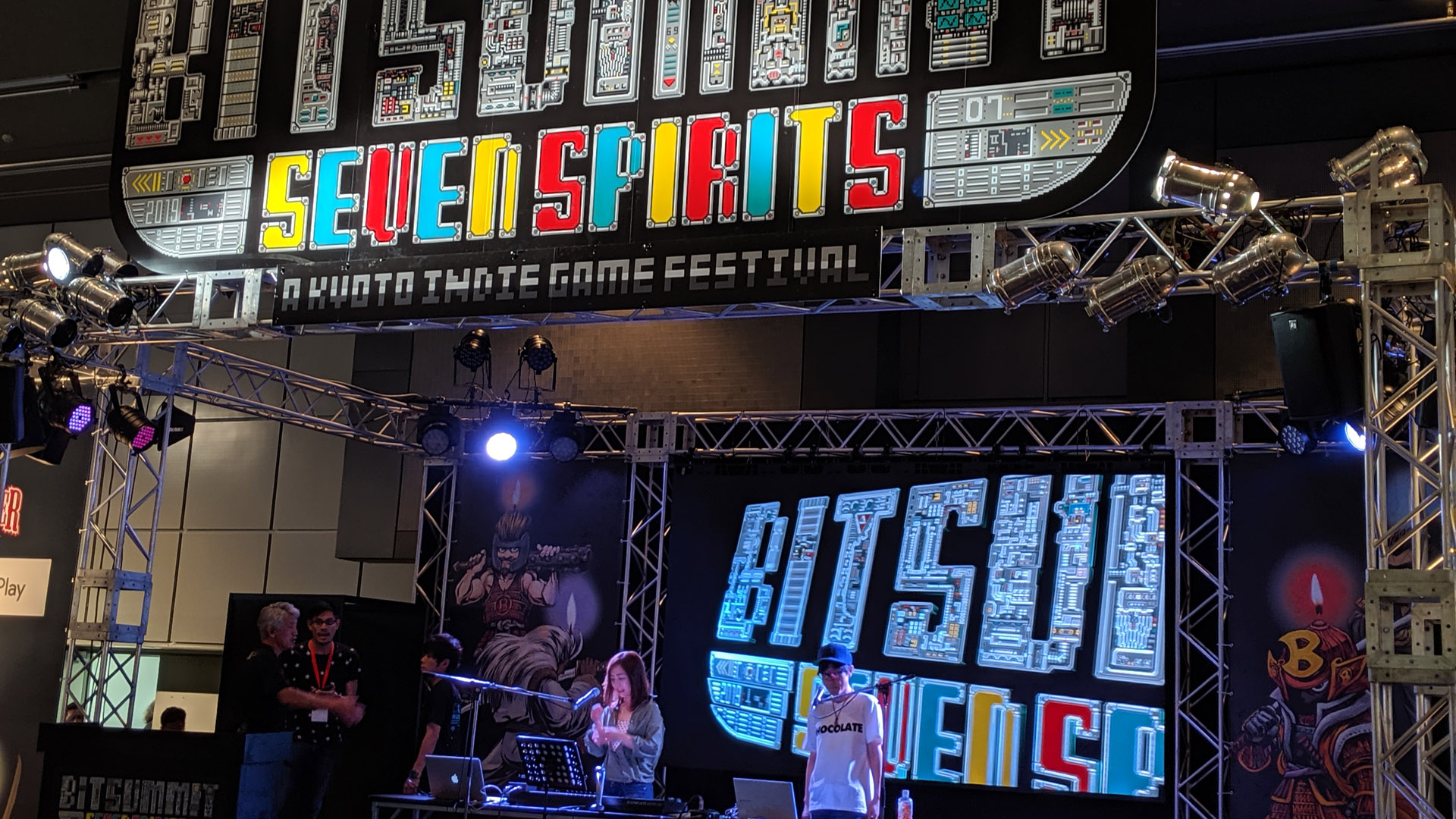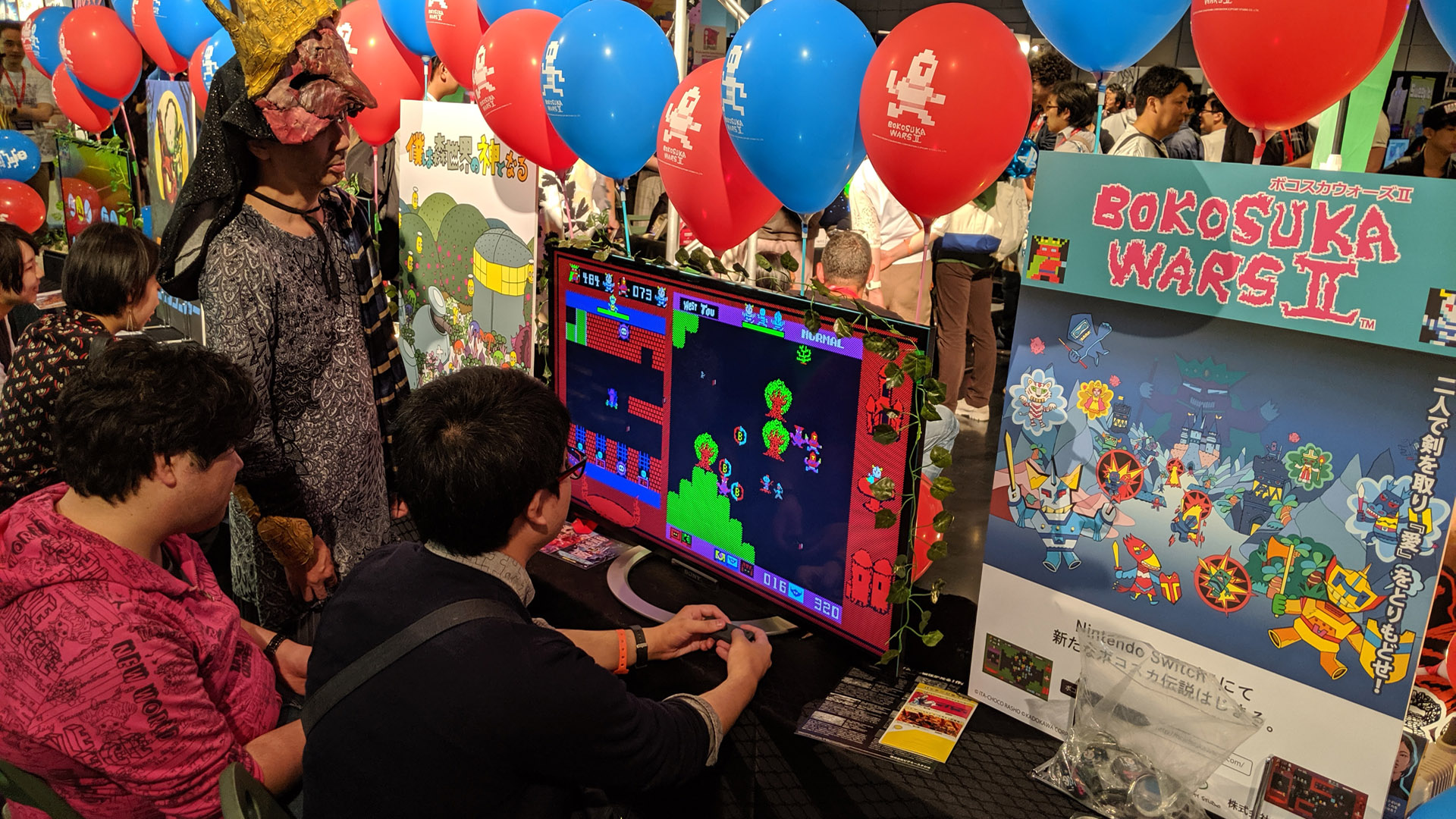Bitsummit is paving the way for indie gaming in Japan
A two-day meeting of minds.

This is part four of a five-part series exploring PC gaming in Japan. The features originally ran in issue 335 of PC Gamer UK. We'll be publishing a new one each day this week, so be sure to come back for more of Wes' roadtrip.
The walk to Kyoto’s Miyako Messe convention centre from Kiyamachi street, home to a thousand bars and restaurants packed into a few blocks, takes me over the river that bisects Kyoto, where in the morning cyclists pedal along a serene shaded path, and in the evening hundreds of game developers will gather with six-packs of beer from 7-Eleven to talk about Bitsummit. It’s a gaming event not quite like any other I’ve been to. It has an energetic but laid-back vibe even now in its seventh year, as it’s grown large enough to draw Nintendo, Sony, and Microsoft into the same compact convention hall. But indies are still very much the stars, and they’ve come from all over to show off their games and make a splash they might not be able to at a bigger event like E3.
“In the beginning, it was much smaller scale. Almost like an indie meetup,” says Kazutoshi Iida, who once made genre-defying games like Doshin the Giant and is now a game design professor. “Some people didn’t even have games to display, just ideas printed on paper, and they’d just talk about the ideas, talk about the games they want to make.”
In the beginning, it was much smaller scale. Almost like an indie meetup.
Kazutoshi Iida
The show’s too big for that now, but the spirit remains in developers who splinter off at night, searching Kiyamachi for the perfect microbar to talk about making games in. Someone tells me that Bitsummit is the only event where you’ll see Japanese industry icons just hanging out, and they’re right. Over the weekend I spot Deadly Premonition developer Hidetaka ‘Swery’ Suehiro by his booth, action game hero Hideki Kamiya with his Platinum crew, and talk to Koji Igarashi about Bloodstained: Ritual of the Night. I regret to inform you that he does not pull off the cowboy hat.
Bitsummit is still a small convention, but the variety of cool indie games is overwhelming. There’s a row of Japanese ‘doujin’ fangames, a row of games from China’s fast-growing indie scene, a smattering of student games, and just cool, weird stuff everywhere you look. Japan-based indie publisher Dangen Entertainment has one of the show’s biggest booths, and is showing off platformers and adventure games and more good stuff than I have time to play, like the 2018 action-RPG hit CrossCode.
Developer diversity
One I do play is Smelter, a bizarre but cool hybrid of Mega Man X platformer and real-time strategy, from a small team of foreign developers based in Osaka. “We have members from Indonesia, Spain, Germany, Iran and the US so it’s quite the combination,” says developer Brian Otten. “Although our company is pretty much 95 percent Japanese, the development team is composed completely of foreign devs. We’re a really new addition to our company and still small with only five members.”
The hard truth is many of these games at Bitsummit aren’t polished enough, or flashy enough, to break out and succeed on Steam. But Darin Ito, who works for publisher Degica in Tokyo, argues that showing a game at an event like Bitsummit doesn’t have to accomplish that to be worthwhile. “Developers can meet other developers or publishers, or just get advice on how to self-publish. Quality is going up,” he says.
The biggest gaming news, reviews and hardware deals
Keep up to date with the most important stories and the best deals, as picked by the PC Gamer team.
Degica not only publishes games, but actually serves as a payment processor for online retailers. Without it, the PC’s small but growing Japanese audience may not exist today. “One thing I’ve been noticing is a lot more western titles are getting Japanese translations quicker,” Ito says. “There are more Japanese users buying things on Steam itself. Degica actually handles the payment system for Steam in Japan. You can buy Steam cards at the convenience store, which is a huge help for people, because a lot of people still don’t use credit cards here. It just makes it a lot easier to buy games.”

As Bitsummit grows, it runs the risk of losing some of the intimate feel that defines it. At midnight on the river I find Kazdal in the crowd. “This is crazy,” he says, looking around at how many people have turned out.
I get the sense that this is a far cry from the exclusive club that was the river party of three years ago, and it’s easy to picture Bitsummit three years from now, bigger and more formal, some of its magic lost. But that would also mean that its mission to fuel indie development in Japan was a success. And even if it grows into something a little bigger, a little more buttoned-up, it’s still in Kyoto. The city has magic to spare.

Wes has been covering games and hardware for more than 10 years, first at tech sites like The Wirecutter and Tested before joining the PC Gamer team in 2014. Wes plays a little bit of everything, but he'll always jump at the chance to cover emulation and Japanese games.
When he's not obsessively optimizing and re-optimizing a tangle of conveyor belts in Satisfactory (it's really becoming a problem), he's probably playing a 20-year-old Final Fantasy or some opaque ASCII roguelike. With a focus on writing and editing features, he seeks out personal stories and in-depth histories from the corners of PC gaming and its niche communities. 50% pizza by volume (deep dish, to be specific).

